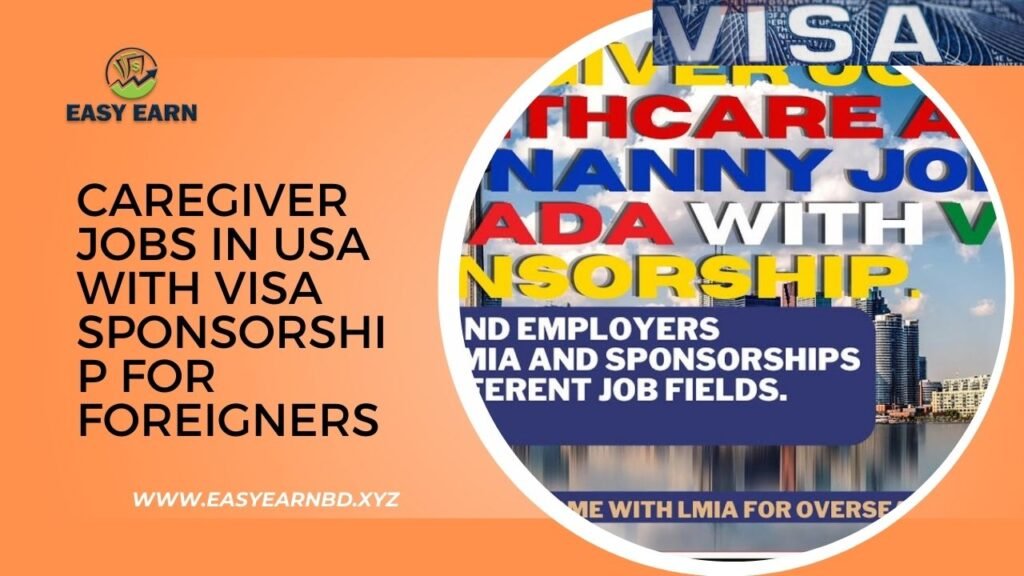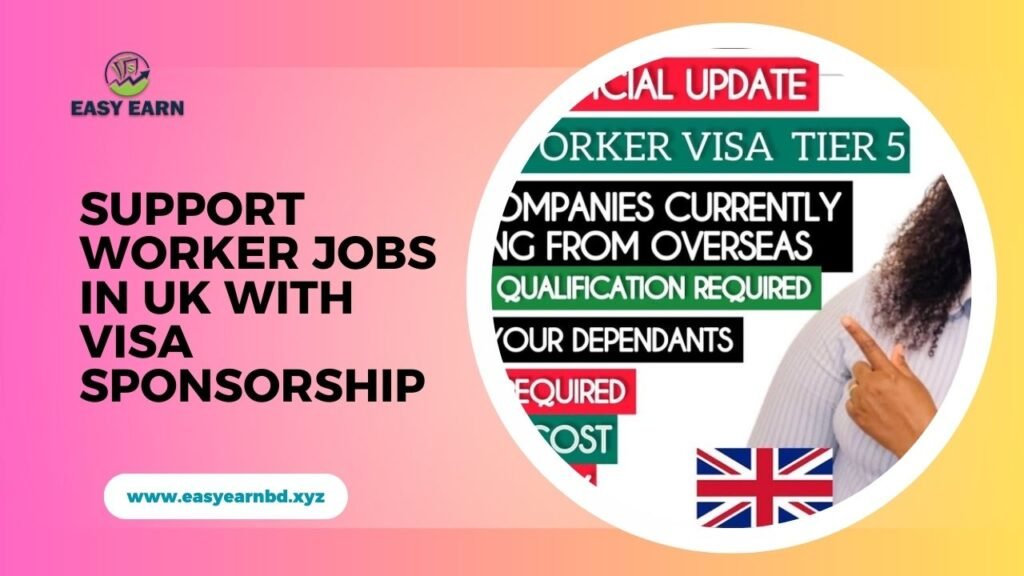Caregiver Jobs in the USA with Visa Sponsorship for Foreigners
Caregiver jobs in the USA are an essential part of the healthcare system, with a growing demand for trained and compassionate individuals who can provide care and support to elderly individuals, people with disabilities, and those recovering from illnesses or surgeries. For foreign nationals looking to work in the United States, caregiver positions offer a viable opportunity, as many employers are willing to sponsor work visas for qualified candidates. This article explores everything you need to know about caregiver jobs in the USA with visa sponsorship for foreigners, including the types of caregiving positions, how to apply, visa options, and the job outlook for caregivers in the United States.
You May Also Like:

What are Caregiver Jobs?
Caregivers are individuals who provide non-medical assistance to people who are elderly, disabled, or ill. Their duties often include helping clients with daily activities such as bathing, dressing, meal preparation, housekeeping, and transportation. Caregivers play a vital role in maintaining the quality of life for their clients by offering support with mobility, managing personal hygiene, and ensuring a safe living environment.
There are different types of caregiver roles, including:
- Home Care Aides: These caregivers assist patients at home, providing personal care services such as bathing, grooming, dressing, and meal preparation.
- Personal Care Assistants (PCAs): Similar to home care aides but may also assist with tasks such as medication reminders or light housekeeping.
- Companion Caregivers: Primarily responsible for companionship and monitoring, ensuring that the client is not lonely or isolated.
- Certified Nursing Assistants (CNAs): These professionals often provide more advanced care, including monitoring vital signs and assisting with physical therapy exercises.
- Live-In Caregivers: These caregivers reside with their clients, providing full-time care.
As the aging population grows in the United States, there is a strong demand for caregivers. Many healthcare agencies, nursing homes, and families are seeking skilled workers to fill these positions, creating opportunities for foreign nationals to find work in the U.S. with visa sponsorship.
VISA Sponsorship for Foreign Caregivers
Foreign nationals who want to work as caregivers in the USA will typically need a work visa, as most caregivers are not eligible for employment under the standard tourist or visitor visa. However, there are several types of work visas that may be suitable for foreigners seeking caregiver jobs in the United States.
1. H-2B Visa for Non-Agricultural Workers
The H-2B visa is a non-immigrant visa that allows U.S. employers to hire foreign workers for temporary, non-agricultural jobs. Many caregivers, especially those hired by private families or home care agencies, can be sponsored under this visa category. While the H-2B visa does not provide a direct path to permanent residency, it is a good option for foreign nationals looking for short-term employment in caregiving.
- Eligibility Requirements:
- The employer must demonstrate a need for temporary workers.
- The foreign worker must have a job offer from a U.S. employer.
- The worker must meet the qualifications set by the employer for the caregiving role.
- The work must be seasonal or intermittent, with a specific start and end date.
2. EB-3 Visa (Employment-Based Third Preference)
For foreign workers looking to live and work permanently in the United States, the EB-3 visa may be a suitable option. This is an employment-based immigrant visa that allows skilled workers, professionals, and unskilled workers (including caregivers) to enter the U.S. and apply for permanent residency (Green Card).
Caregivers who work in settings like nursing homes or as live-in aides can qualify for this visa if they meet the necessary education and experience requirements.
- Eligibility Requirements:
- A job offer from a U.S. employer who is willing to sponsor the worker.
- At least two years of experience in a caregiver-related occupation, or a demonstrated ability to perform the duties of the job.
- A willingness to work in the U.S. for the sponsoring employer.
3. B-1 Visa for Domestic Workers
The B-1 visa is a non-immigrant visa for foreign workers who are coming to the U.S. to work for a foreign national employer. Domestic workers, including caregivers, may be eligible for a B-1 visa if they meet certain conditions, such as working for a U.S. citizen or lawful permanent resident and receiving appropriate compensation.
While the B-1 visa is often used by domestic workers who work in the U.S. on a temporary basis, it does not provide the same long-term opportunities as the EB-3 visa.
- Eligibility Requirements:
- Must be employed by a foreign national employer.
- Must meet the qualifications for the caregiving role.
- Must be able to prove that the work will be temporary.
How to Find Caregiver Jobs in the USA with Visa Sponsorship
Securing a caregiver job in the U.S. with visa sponsorship can be competitive, but with the right approach, foreign nationals can find opportunities. Here are some tips for finding caregiver jobs with visa sponsorship:
1. Research U.S. Employers Who Sponsor Work Visas
Not all employers are willing to sponsor work visas, so it’s essential to target employers who are experienced with sponsoring foreign workers. Many large healthcare facilities, home care agencies, and senior living communities are familiar with the visa sponsorship process.
- Job Boards and Websites: Look for caregiving job listings on websites like Indeed, Glassdoor, and LinkedIn. Some specialized job boards, like Care.com or the National Caregivers Association, may also feature positions for caregivers.
- Healthcare Agencies: Many healthcare staffing agencies hire caregivers and can assist with the visa sponsorship process.
- Nursing Homes and Senior Care Facilities: Facilities that provide long-term care for elderly individuals often hire foreign caregivers and may offer sponsorship.
2. Tailor Your Resume and Application to U.S. Standards
When applying for caregiver positions in the U.S., ensure your resume follows the standard format used in the U.S. Include detailed information about your caregiving experience, qualifications, and any relevant certifications. Mention any additional skills that may make you stand out, such as the ability to speak multiple languages, knowledge of medical terminology, or familiarity with specific caregiving techniques.
3. Apply for the Right Type of Visa
Once you secure a job offer from an employer willing to sponsor your visa, you will need to work with the employer to apply for the appropriate visa. This process involves several steps, including submitting an application to U.S. Citizenship and Immigration Services (USCIS), undergoing an interview at a U.S. embassy or consulate, and waiting for approval. Your employer will typically guide you through this process.
4. Prepare for an Interview
If you are selected for an interview, be sure to research the company or employer thoroughly and understand the caregiving responsibilities. Be prepared to answer questions about your experience, qualifications, and the type of care you are most comfortable providing. Additionally, understand the U.S. work culture, especially in caregiving settings, and be ready to adapt to different work environments.
The Job Outlook for Caregivers in the USA
The demand for caregivers in the United States is expected to continue growing due to the aging baby boomer population and the increased need for long-term care services. According to the U.S. Bureau of Labor Statistics (BLS), employment of home health aides is projected to grow 25% from 2021 to 2031, much faster than the average for all occupations. This growth will likely result in more job opportunities for caregivers, both for U.S. citizens and foreign nationals.
Additionally, there is an increasing demand for specialized caregivers who can handle more complex medical needs or provide care for individuals with specific conditions such as Alzheimer’s or Parkinson’s disease. Foreign nationals with specialized training or experience may have an advantage when applying for these roles.
Conclusion
Caregiver jobs in the USA with visa sponsorship provide an excellent opportunity for foreign nationals seeking to work in a rewarding and essential field. With the growing demand for caregivers across the country, employers in healthcare, home care, and senior living industries are increasingly open to sponsoring work visas for skilled and compassionate workers. By understanding the visa options, preparing a strong job application, and targeting employers who support foreign workers, caregivers can navigate the process of finding a job in the U.S. and contribute to the well-being of individuals in need of care.
Frequently Asked Questions (FAQ)
What is a caregiver job?
A caregiver job involves providing assistance to individuals who need help with daily activities due to age, illness, or disability. Caregivers may help with tasks such as personal hygiene, dressing, eating, bathing, cleaning, cooking, medication reminders, and providing companionship. Some caregivers also assist with mobility and ensure the safety and comfort of their clients.
Can foreigners get caregiver jobs in the USA?
Yes, foreigners can get caregiver jobs in the USA, but they must go through the appropriate visa process. Many employers are willing to sponsor foreign workers for caregiving roles, especially given the high demand for qualified caregivers in the U.S. However, you will need to secure a job offer from a U.S. employer who is willing to sponsor your visa.
You May Also Like:

What are the visa options for foreigners applying for caregiver jobs in the USA?
There are several visa options for foreigners seeking caregiver jobs in the USA:
- H-2B Visa: A temporary, non-agricultural visa for seasonal or short-term work. Many caregiving roles, particularly for home care aides, fall under this visa.
- EB-3 Visa (Employment-Based Third Preference): For skilled workers, including caregivers, who want to live and work permanently in the U.S. It requires a permanent, full-time job offer from a U.S. employer.
- B-1 Visa (Domestic Worker): For foreign workers employed by U.S. citizens or lawful permanent residents, typically for temporary positions.
Each visa has different requirements, so it’s important to consult with an immigration attorney or your employer to determine the best option.
How can I apply for caregiver jobs in the USA with visa sponsorship?
To apply for caregiver jobs in the U.S. with visa sponsorship, follow these steps:
- Research Employers: Look for employers or agencies that sponsor foreign workers. Websites like Indeed, LinkedIn, and Care.com often have job listings for caregivers.
- Apply for Jobs: Submit your resume and cover letter tailored to U.S. standards. Highlight your caregiving experience, skills, and certifications.
- Secure a Job Offer: Once you receive a job offer, the employer will guide you through the visa application process. Be prepared to provide documents such as proof of experience, qualifications, and any certifications (like CPR or CNA).
- Visa Sponsorship: Your employer will file a petition with U.S. Citizenship and Immigration Services (USCIS) to sponsor your visa.
What qualifications do I need to work as a caregiver in the USA?
The qualifications to work as a caregiver in the U.S. vary depending on the role. Some common qualifications include:
- Experience: Most caregiving jobs require prior experience in a caregiving role. The more experience you have, the more competitive your application will be.
- Training/Certifications: While not always mandatory, certifications like Certified Nursing Assistant (CNA), CPR, or First Aid can make you more marketable to employers. Some states may also require additional certifications or licenses.
- Language Skills: Being able to communicate effectively in English is important, especially in caregiving roles where you need to follow instructions and interact with clients.
How long does the visa application process take for caregivers?
The visa application process can vary depending on the type of visa and your specific circumstances. For the H-2B visa, the process may take several months, as the employer must submit a petition and wait for approval from U.S. Citizenship and Immigration Services (USCIS). Similarly, the EB-3 visa can take up to a year or longer, as it involves a more detailed process for permanent residency.
If you’re applying for the B-1 visa, the process might be quicker, but this visa is typically used for temporary work arrangements.
It’s important to start the process early and be patient.
Can I apply for permanent residency while working as a caregiver in the USA?
Yes, it is possible to apply for permanent residency (a Green Card) while working as a caregiver in the U.S., especially if you are sponsored under the EB-3 visa. The EB-3 visa is a pathway to permanent residency for skilled workers, including caregivers, once you meet the requirements and fulfill the job offer conditions.
For other visas like the H-2B visa, it is a temporary visa and does not provide a direct path to permanent residency. You would need to transition to another visa type if you wish to pursue permanent residency.
Will my employer provide housing or accommodations?
In some cases, especially with live-in caregiver positions, the employer may offer housing or room and board as part of the job offer. This is often the case for caregivers working with elderly clients or individuals with special needs who require around-the-clock care. However, this varies by employer, so it’s important to clarify the living arrangements before accepting a job offer.
What is the salary for caregivers in the USA?
Salaries for caregivers in the U.S. can vary depending on factors such as location, experience, qualifications, and the type of caregiving job. On average, the U.S. Bureau of Labor Statistics reports that the median wage for home health aides in 2021 was around $27,080 per year. However, live-in caregivers or those working in high-demand areas may earn higher salaries.
In addition to wages, some employers may offer benefits like health insurance, paid time off, and housing accommodations, particularly for live-in positions.
Can I bring my family with me to the USA while working as a caregiver?
Yes, in some cases, foreign workers on certain visas (like the H-2B or EB-3 visa) may be able to bring their spouse and children under the age of 21 to the U.S. under a dependent visa. However, the specifics depend on the type of visa and the employer’s sponsorship agreement. You should consult with your employer or an immigration attorney to understand the rules for bringing family members with you.
Are there any language requirements to work as a caregiver in the USA?
While specific language requirements vary by employer and location, being able to communicate effectively in English is generally important in caregiving roles. You may need to understand and follow instructions, report on the condition of your client, and communicate with other medical professionals. In some cases, caregivers who are not fluent in English may be required to pass a language proficiency test or receive additional language training.
What are the job prospects for caregivers in the USA?
The demand for caregivers in the U.S. is growing rapidly. According to the U.S. Bureau of Labor Statistics, the employment of home health aides is expected to grow by 25% from 2021 to 2031, much faster than the average for all occupations. This growth is driven by the aging population and the increasing preference for people to receive care at home rather than in institutions. Therefore, the job prospects for caregivers, especially those with specialized training and experience, are excellent.

My name is sakib. farom is Bangladesh.job hulder food man food delivery, evethinc